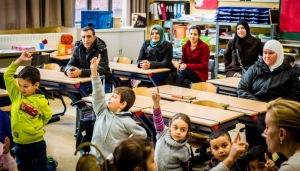Short summary
The Flemish community and the city of Antwerp organize Dutch courses for new citizens. But many people find barriers to participate in these courses: it is a difficult to organise and schedule it with the children, the lessons are in the evening or in another city district. KAAP is a project for parents to learn Dutch in the school of their children. But knowing Dutch is not enough for parents to be partners in the triangle school – child – parent. Therefore the KAAP-project also is about linking language training with parental involvement.

Context of good practice
More than 180 nationalities live in Antwerp. The mother tongue for more than 50 % of the children in Antwerp schools is not Dutch. Many newcomers are obliged to learn Dutch but are put on a waiting list.
Knowing that language is a major success factor for new citizens, the city of Antwerp has initiated the KAAP program: an embedded language course on the communication between parents and schools. The program is developed by the Center for Language and Education (University of Leuven). It is introduced in 5 Flemish cities. The City of Antwerp has taken ownership of the program and introduced it in their city.
- First, the parents learn to communicate directly with the school community and about relevant things concerning the school career of their children in order to improve communication between parents and school in the long term.
- Second, KAAP leads to (more) parental involvement by allowing the parents to get to know the school better. This involvement is also beneficial to the learners. Parents learn about the benefits of education and are more likely to support their children to get their degrees.
Main characteristics of the challenge, description of the target group
The program tries to:
- tackle the problem of low-educated parents to get involved in the school life and education of their children
- organise Dutch classes in the school of their children
- Who was involved in the challenge? Please describe the target group
KAAP is a network with seven partners. The partners and their main tasks are described as follows:
- General education policy Antwerp: - Coordination - Organisation - Financing
- Center for language & education: - Methodology - Support of language teachers - Evaluation
- Centre for adult education (CBE & CVO): - Language teachers
- House of the Dutch language:- Screening of the parents
- Schoolbridge: - Childcare - Publicity -Bridge between parents and school -Bridge between language teachers and school - Screening of the schools
- Schools: - Promoting KAAP -Teacher who is bridge between KAAP and the school
- Parents - Being engaged to the school
Success factors and processes
The KAAP program is offered by the city of Antwerp and run by the individual schools. If a school want to offer the KAAP courses to the parents of their learners, the following timeframe applies:
- January: schools apply for the KAAP program
- March/April: screening of the candidate schools
- May: selection of the KAAP schools
- September: screening of the parents
- October: start of KAAP lessons (2 X 3 hours/ week during the school year)
- March: meeting with KAAP schools: how to work with parents when KAAP finished
Impact of measures taken
KAAP offers an answer to problems of parents: learning about school and learning Dutch in a ‘safe’ environment. This project can be transferred to other municipalities.
- if they communicate more and better with the school community in comparison with the period before the course
- if the cooperation of the school and the parents has been influenced by the course.
- Conclusions: KAAP has impact on
- giving information, paying attention to the school agenda and helping the child at home;
- contacts with teachers, parent contact and written communication with the school.
Parents emphasize KAAP made difference in the school – parent – child cooperation. However, KAAP only makes a little difference on parental involvement on school level: participation in school activities and school policy.
Read full descriptionClose full description
Author:
Gerrit Bernaerts
Institution:
City of Antwerp

